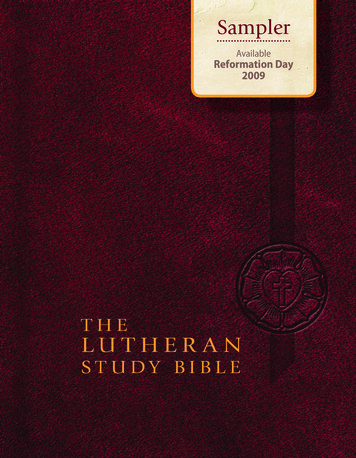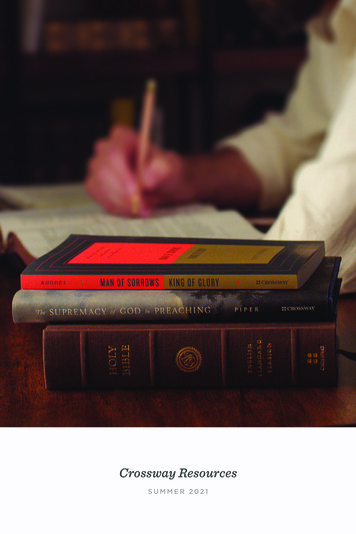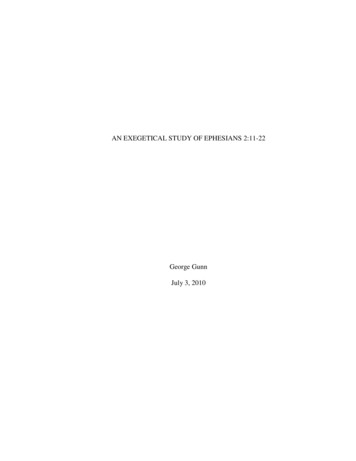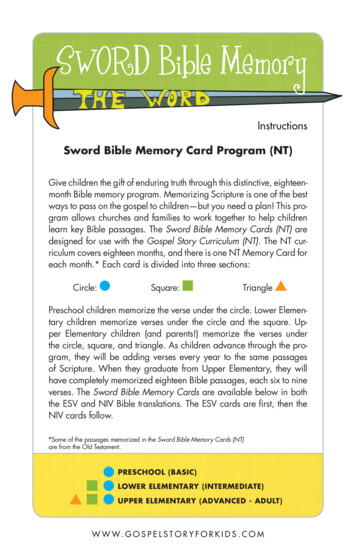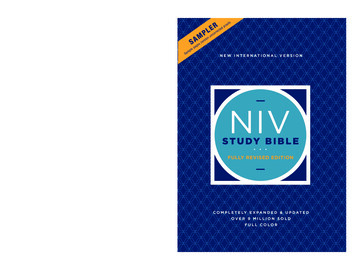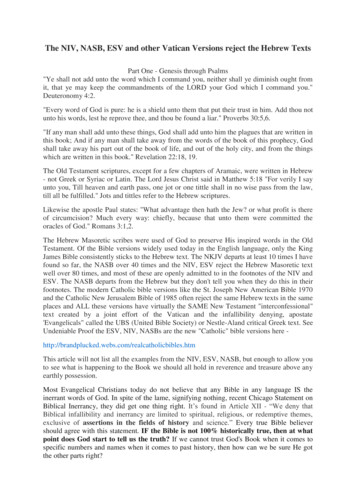
Transcription
The NIV, NASB, ESV and other Vatican Versions reject the Hebrew TextsPart One - Genesis through Psalms"Ye shall not add unto the word which I command you, neither shall ye diminish ought fromit, that ye may keep the commandments of the LORD your God which I command you."Deuteronomy 4:2."Every word of God is pure: he is a shield unto them that put their trust in him. Add thou notunto his words, lest he reprove thee, and thou be found a liar." Proverbs 30:5,6."If any man shall add unto these things, God shall add unto him the plagues that are written inthis book; And if any man shall take away from the words of the book of this prophecy, Godshall take away his part out of the book of life, and out of the holy city, and from the thingswhich are written in this book." Revelation 22:18, 19.The Old Testament scriptures, except for a few chapters of Aramaic, were written in Hebrew- not Greek or Syriac or Latin. The Lord Jesus Christ said in Matthew 5:18 "For verily I sayunto you, Till heaven and earth pass, one jot or one tittle shall in no wise pass from the law,till all be fulfilled." Jots and tittles refer to the Hebrew scriptures.Likewise the apostle Paul states: "What advantage then hath the Jew? or what profit is thereof circumcision? Much every way: chiefly, because that unto them were committed theoracles of God." Romans 3:1,2.The Hebrew Masoretic scribes were used of God to preserve His inspired words in the OldTestament. Of the Bible versions widely used today in the English language, only the KingJames Bible consistently sticks to the Hebrew text. The NKJV departs at least 10 times I havefound so far, the NASB over 40 times and the NIV, ESV reject the Hebrew Masoretic textwell over 80 times, and most of these are openly admitted to in the footnotes of the NIV andESV. The NASB departs from the Hebrew but they don't tell you when they do this in theirfootnotes. The modern Catholic bible versions like the St. Joseph New American Bible 1970and the Catholic New Jerusalem Bible of 1985 often reject the same Hebrew texts in the sameplaces and ALL these versions have virtually the SAME New Testament "interconfessional"text created by a joint effort of the Vatican and the infallibility denying, apostate'Evangelicals" called the UBS (United Bible Society) or Nestle-Aland critical Greek text. SeeUndeniable Proof the ESV, NIV, NASBs are the new "Catholic" bible versions here mThis article will not list all the examples from the NIV, ESV, NASB, but enough to allow youto see what is happening to the Book we should all hold in reverence and treasure above anyearthly possession.Most Evangelical Christians today do not believe that any Bible in any language IS theinerrant words of God. In spite of the lame, signifying nothing, recent Chicago Statement onBiblical Inerrancy, they did get one thing right. It’s found in Article XII - “We deny thatBiblical infallibility and inerrancy are limited to spiritual, religious, or redemptive themes,exclusive of assertions in the fields of history and science.” Every true Bible believershould agree with this statement. IF the Bible is not 100% historically true, then at whatpoint does God start to tell us the truth? If we cannot trust God's Book when it comes tospecific numbers and names when it comes to past history, then how can we be sure He gotthe other parts right?
It is devastating for the modern version promoter to see where the New Jerusalem Catholicbible lands on these verses. Also notice how the previous Catholic Douay-Rheims read. Itwas a whole lot closer to the historical truth than are these more modern translations.The following short list is just a sampling of the divergent and confusing readings foundamong the contradictory modern bible versions. There are numerous other examples, butthese are just a few to make you aware of what is going on here with "the late t in cholar hip Finding ".Among these “historic details” are whether Jeremiah 27:1 reads Jehoiakim (Hebrew texts,RV, ASV, NKJV, KJB, ISV, Douay-Rheims) or Zedekiah (RSV, NIV, NASB, ESV, NET,Holman, Catholic New Jerusalem 1985)whether 2 Samuel 21:8 reads Michal (Hebrew texts, KJB, NKJV, RV, ASV, Douay-Rheims)or Merab (RSV, NIV, NASB, ESV, NET, Holman, ISV, Catholic New Jerusalem)or 70 (NASB, NKJV, RV, ASV, RSV, NRSV, Holman, ISV, KJB) being sent out by theLord Jesus in Luke 10:1 and 17 or 72 (NIV, ESV, NET, Catholic New Jerusalem)or in Matthew 18:22 does the Lord say to forgive your brother not “until 7 times, but unto 70times 7 times” ( 490 times - KJB, RV, ASV, NASB, NKJV, RSV, ESV, ISV, DouayRheims, ALL Greek texts) or 77 times (NRSV, NIV, Catholic New Jerusalem)or the 7th day in Judges 14:15 (KJB, NKJV, RV, ASV, Douay-Rheims) or the 4th day (RSV,ESV, NASB, NIV, NET, Catholic New Jerusalem) or "the NEXT day" ISV (they just madethis up!)Or Hannah taking young Samuel to the house of the LORD with THREE bullocks in 1Samuel 1:24 (KJB, Hebrew texts, RV, ASV, JPS 1917, NKJV, Youngs, NET, DouayRheims) or “A THREE YEAR OLD BULL: (LXX, Syriac RSV, ESV, NIV, NASB, ISV,Holman, Catholic New Jerusalem)or God smiting 50,070 men in 1 Samuel 6:19 (KJB, RV, ASV, NASB, NET, ISV, DouayRheims) or 70 men slain (RSV, NIV, NRSV, ESV, Catholic New Jerusalem), or “70 men- 50chief men” (Young’s), or “70 MEN OUT OF 50,000 Holman Standardor there being 30,000 chariots in 1 Samuel 13:5 (KJB, NKJV, RV, ASV, NASB, RSV,NRSV, ESV, ISV, Douay-Rheims) or only 3000 (NIV, NET, Holman, Catholic NewJerusalem)or 1 Samuel 13:1 Here we read: “Saul reigned ONE year; and when he had reigned TWOyears over Israel, Saul chose him three thousand men of Israel.” reading - ONE/TWO years(NKJV, KJB, Geneva, Judaica Press Tanach), or 40/32 (NASB 1972-77) or 30/42 (NASB1995, NIV), OR 30 years/ 40 years (NET) or years and. and two years (RSV,NRSV, ESV, St. Joseph New American Bible 1970, Catholic New Jerusalem 1985), or "was30 years old.ruled for 42 years" ISV, or even “32 years old.reigned for 22 years” in the1989 Revised English Bible!2 Samuel 15:7 “forty years” (KJB, Hebrew, Geneva, NKJV, NASB, RV, Douay-Rheims) OR“four years” (NIV, RSV, ESV, NET, Catholic New Jerusalem). The ISV ADDS words to theHebrew text to make it say what they think it means, saying: "And so it was that forty yearsafter Israel had demanded a king, Absalom asked the king."or whether both 2 Samuel 23:18 and 1 Chronicles 11:20 read “chief of the THREE” (KJB,Hebrew texts, RV, ASV, NKJV, NRSV, Holman, NIV, NET, Holman, NET, Douay-Rheims)or THIRTY from the Syriac (NASB, RSV, ESV, Catholic New Jerusalem) The ISVcompletely omits any number and just makes up their own text saying: "in charge of theplatoons"or 2 Samuel 24:13 reading SEVEN years (KJB, Hebrew, ASV, NASB, NKJV, NET, ISV,Douay-Rheims) or THREE years (LXX, NIV, RSV, NRSV, ESV, Holman, Catholic NewJerusalem)
or whether 1 Kings 4:26 reads 40,000 stalls of horses (Hebrew, KJB, RV, ASV, NASB, ESV,NKJV, ISV, Douay-Rheims) or 4,000 stalls (NIV, NET, Catholic New Jerusalem)or whether 1 Kings 5:11 reads 20 measures of pure oil (Hebrew texts, Geneva, KJB, ASV,RV, NASB, NRSV, ISV, Douay-Rheims) or 20,000 (RSV, NIV, ESV, NET, LXX andSyriac, Catholic New Jerusalem)or in 2 Chronicles 31:16 we read "males from THREE years old" (Hebrew texts, KJB,Geneva Bible, Wycliffe, LXX, Syriac, RV, ASV, RSV, NRSV, ESV, NIV, NKJV, Holman,NET, Douay-Rheims) or "males from THIRTY years old" (NASB - ft. Hebrew “three”, ISV "every male 30 years old and older", Catholic New Jerusalem)or where 2 Chronicles 36:9 reads that Jehoiachin was 8 years old when he began to reign(Hebrew texts, KJB, NASB, NKJV, RV, ASV, KJB, RSV, NRSV, ESV 2001 edition, ISV,Douay-Rheims) or he was 18 years old (NIV, Holman, NET, ESV 2007 edition!!! and onceagain the Catholic New Jerusalem)or that when God raised the Lord Jesus from the dead it is stated in Acts 13:33 “this day haveI begotten thee” (KJB, NASB, NKJV, RV, RSV, NRSV, ESV, Douay-Rheims) or “today Ihave become your Father” (NIV, Holman, NET, ISV, Catholic New Jerusalem).If you go back and read through this list of just some of the numerous very real differencesthat exist among these Bible of the Month Club versions, ask yourself which (if any) are the100% historically true words of God. IF "the Bible" is not 100% historically true in theevents it narrates, then when does God start to tell us the truth, the whole truth and nothingbut the truth?As for the ESV, you can see a lot more examples of how this revamped RSV version oftenrejects the clear Hebrew readings and has changed over 300 verses from the 2001 to the 2007editions - http://brandplucked.webs.com/theesv.htmRemember, God said that no man should add to or take away from His words.Genesis 4:8 KJB "And Cain talked with Abel his brother: AND IT CAME TO PASS, whenthey were in the field, that Cain rose up against Abel his brother, and slew him."NIV - "Now Cain said to his brother Abel, LET'S GO OUT TO THE FIELD. And while theywere in the field, Cain attacked his brother Abel and killed him."The NIV omits the verb "and it came to pass". In fact, the NIV complete concordance willtell you that they have "not translated" this verb a whopping 887 times. Not only does theNIV not translate this verb here but they also added "Let's go out to the field." The HolmanChristian Standard also adds "Let's go out to the field" as does Dan Wallace's NET version.Wallace footnotes - "The MT has simply “and Cain said to Abel his brother,” omitting Cain’swords to Abel. It is possible that the elliptical text is original. " Their own footnotes say thisreading comes from the Samaritan Pentateuch, the Septuagint (LXX - Greek), the Vulgate(Latin) and the Syriac but that the phrase is not found in the Hebrew Masoretic text. Guesswhich other bible versions also include these added words. That's right, the Catholic Douay,St. Joseph NAB and the New Jerusalem bible all have these extra words in them that are notfound in the Hebrew Scriptures.This additional phrase is not found in the NASB, NKJV, RV, ASV, ESV or any Hebrewtranslation.Other places in Genesis where the NIV departs from the Hebrew are Genesis 4:15; 10:23;36:24; and 47:31 where instead of "bowed himself upon the bed's head" (KJB, NASB, NKJV,Holman), the NIV says "he leaned on the top of his staff." This reading comes from the LXXand not the Hebrew, and Jacob didn't lean on the top of his staff until after the events of thenext chapter. See Hebrews 11:21.
Genesis 47:21 KJB "And as for the people, HE REMOVED THEM TO CITIES form oneend of the borders of Egypt even to the other end thereof." This is also the reading of theGeneva Bible, Youngs, Darby, the NKJV, RV, ASV, Holman Standard, Hebrew NamesVersion, the Jewish JPS 1917, the NASB 1995 and the Spanish Reina Valera 1995, to namejust a few.NIV - "And JOSEPH REDUCED THE PEOPLE TO SERVITUDE from one end of Egypt."The NIV footnote says this comes from the Samaritan and the LXX, but that the Hebrewsays: "he removed them to the cities". This false reading taken from the so called LXX is alsothat of the liberal RSV, the NRSV, ESV, Message and the NET version put out by DanielWallace and company. It is also the reading found in the modern Catholic versions like theSt. Joseph and the New Jerusalem, though the earlier Catholic bibles like the Douay-Rheimsand the Douay of 1950 read like the KJB and followed the Hebrew texts. Wallace footnotesthat the Hebrew reading of "he removed them to cities" makes no sense in the context. Well,bible agnostics like Daniel Wallace are entitled to their humble opinions, but I and millions ofother Bible believers maintain that God did not make a mistake and the Hebrew Scripturesare right.John Gill comments on this verse: "And as for the people, he removed them From theplaces where they dwelt, that it might appear they had no more property there, and mightforget it, and be more willing to pay rent elsewhere; and their posterity hereafter could haveno notion of its being theirs, or plead prescription; and besides, by such a removal andseparation of the inhabitants of cities, some to one place, and some to another, sedition andmutiny might be prevented: he had them to cities, from one end of the borders of Egypt,even unto the other end thereof; according to the Targums of Jonathan and Jerusalem, thosethat dwelt in provinces, or in country towns and villages, he removed to cities, and those thatdwelt in cities he removed into provinces, and placed them at the utmost distance from theirformer habitations, for the reasons before given."Adam Clarke also agrees with the Hebrew and KJB reading and says it would be easier tofeed the people where the corn was being stored, that is, in the cities, and to then have someothers out working the fields. The KJB is right and the fake bible versions are wrong forrejecting the Hebrew texts and following some fanciful Samaritan Pentateuch or the allegedSeptuagint.The NIV also departs from the Hebrew in the following verses, though the NASB does not.Lev. 14:31; Numbers 24:17; 26:40; Deut. 23:18; 28:20; Joshua 15:4; 16:2; 18:18; 19:28, 34;Judges 8:8; and 9:29.Exodus 3:19 "no, not by a mighty hand."NASB, NIV, RSV, NRSV, ESV all depart from the Hebrew and change the meaning ofExodus 3:19.In Exodus chapter three the LORD tells Moses what He is going to do to Pharoah and hisland. In 3:19-20 we read in the King James Bible: "And I am sure that the king of Egypt willnot let you go, NO, NOT BY A MIGHTY HAND. And I will stretch out MY HAND, andsmite Egypt with ALL MY WONDERS which I will do in the midst thereof: AND AFTERTHAT he will let you go."The meaning is quite clear in the King James Bible for those who believe the Book and haveeyes to see. God Himself is going to stretch out His mighty hand over Egypt and bring a
series of 10 plagues upon the land, yet, in spite of the first nine plagues, God will harden theheart of Pharoah and he will refuse to let the people go. Only after the 10th and final plagueof the death of the firsborn will God move upon Pharoah to let the people go. Even after that,God will again harden Pharoah's heart that he pursues after the children to Israel to bringthem back, but they will be drowned in the Red sea.In Exodus 7:4 and again in 9:3 and 15 we read concerning the series of plagues: "But Pharoahshall not hearken unto you, THAT I MAY LAY MY HAND UPON EGYPT, and bring forthmine armies, and my people the children of Israel, out of the land of Egypt BY GREATJUDGMENTS."Exodus 9:3 "Behold, THE HAND OF THE LORD is upon thy cattle which is in the field,upon the horses, upon the asses, upon the camels.there shall be a very grievous murrain."Exodus 9:15 "For now I will stretch out MY HAND, that I may smite thee and thy peoplewith pestilence"The "mighty hand" spoken of in Exodus 3:19 is the hand of God Himself in the first nineplagues. God had raised up Pharoah "for to show in thee my power; and that my name maybe declared throughout all the earth." (Exodus 9:16)The Hebrew texts clearly say exactly what is written in the King James Bible. Not only doesthe KJB say: "And I am sure that the king of Egypt will not let you go, NO, NOT BY AMIGHTY HAND", but so also do the Bishop's Bible 1568, Webster's 1833 translation, theRevised Version, American Standard Version, NKJV, Darby, 1936 Hebrew PublishingCompany's translation, Green's interlinear, KJV 21, and the Third Millenium Bible.However we find that the NIV, NASB, RSV, NRSV, ESV, Holman Standard, the Catholic St.Joseph NAB, the New Jerusalem bible and an host of other versions reject the Hebrewreading and follow the Greek LXX and the Vulgate. You won't see this by consulting theNASB, NIV, but the RSV, NRSV, and ESV let us in on this little secret by saying so in theirfootnotes.In the RSV, NRSV, New Jerusalem bible and ESV we read: "I know that the king of Egyptwill not let you go UNLESS COMPELLED by a MIGHTY HAND"; then is a footnote thesethree versions tell us their reading comes from the LXX and the Vulgate, but that the Hebrewsays "no, not by a mighty hand" - just as found in the King James Bible.The NIV has no footnotes here but it says: "UNLESS a mighty hand COMPELS HIM" - atleast they kept the "mighty hand" part.But the NASB, vaunted so much for being so literal (what a joke), says: "will not let you goEXCEPT UNDER COMPULSION." - thus rejecting the Hebrew reading, following theVulgate, and even paraphrasing this by omitting "mighty hand". It is much like the St. JosephNew American bible of 1970 that says: "unless he is forced."The translators of these versions apparently could not make sense of the passage, thought theHebrew text was in error, and so followed something else according to their ownunderstanding. As a result, they have changed the meaning of the passage.The King James Bible is ALWAYS right.Exodus 14:25 the LORD TOOK OFF their chariot wheels
Exodus chapter 14 relates the event of the children of Israel crossing the Red Sea when Goddivided the waters. The Egyptians pursued after them and were drowned in the sea.In Exodus 14: 24-25 we read: "And it came to pass, that in the morning watch the LORDlooked unto the host of the Egyptians through the pillar of fire and of the cloud, and troubledthe host of the Egyptians, And TOOK OFF their chariot wheels, that they drave themheavily.""TOOK OFF their chariot wheels" is the reading of Tyndale 1530, Coverdale 1535 (smotethe wheels from their chariots), Bishops' Bible 1568, the Geneva Bible 1599, the King JamesHoly Bible 1611, Rotherham's Emphasized bible 1902, the NKJV 1982, the Revised Version1881, the ASV of 1901 (the predecessor of the NASB), the KJV 21, Third Millenium Bible,Hebrew Names Bible, World English Bible, the two Jewish translations of 1917 and 1936,Darby, the Living Bible and 1998 New Living Bible, Green's interlinear, MKJV, the NIV1978 and 1984 editions - "He made the wheels of the chariots COME OFF so that they haddifficulty driving." (NIV 1984) and the Spanish versions - quitó las ruedas.However the "scholarly" NASB tells us : "He caused their chariot wheels TO SWERVE".This is also the reading of the brand new 2004 Holman Christian Standard version.Now I've had the unpleasant experience of having my car wheels swerve on ice or snow, butthankfully I have never had them come off yet. You have to admit there is a differencebetween the Lord taking off their wheels and the Lord causing them to swerve.The word used here is # 5493 soor and it means to remove or take away. It is used inExodus 8:8 "take away the frogs"; in 8:31 "he removed the swarms of flies", in 34:34 Mosestook off the vail", Genesis 41:42 "Pharoah took off his ring" and in Genesis 8:13 "Noahremoved the covering of the ark".Besides the confusion of the NASB and Holman Standard, let's see how some other modernversions clarify this passage for us.The 1950 Catholic Douay version says God OVERTHREW the wheels; but the more recentCatholic versions like the St. Joseph NAB and New Jerusalem bible say God was "clogging"the wheels.The RSV 1952, NRSV, ESV 2002, New English Bible 1970, Daniel Wallace and company'sNET version, The Message AND NOW THE "new" NIV of 2011 all say God "CLOGGEDthe wheels", (NIV 2011 - "He JAMMED the wheels of their chariots") with a footnote thattells us this reading (clogging, jamming) comes from the Septuagint, Samaritan Pentateuchand Syriac; but that the Hebrew text reads "took off" or "removed". Actually, the Greekversion called the Septuagint doesn't say "clogging", as we shall soon see.The Bible in Basic English of 1965 says God "made the wheels STIFF"The New Century Version tells us God "kept the wheels from turning".Young's "literal" (hah) says: "and turneth aside the wheels of their chariots." This wouldmean they swerved, but not that they actually came off.Lamsa's 1936 translation of the Syriac Peshitta reads: "clogging the wheels" (from the Syriacwe get the reading found in the Message, RSV, NRSV, ESV, NET, the "new" NIV 2011 andthe other recent Catholic versions like the St. Joseph New American bible 1970 and the NewJerusalem bible 1985. The Catholic Jerusalem bible reads "He so CLOGGED their chariot
wheels." then it footnotes that the "versions" read 'clogged' but the Hebrew reads "TOOKOFF")Today's English Version 1992 "He made the wheels get stuck"And the famed Greek Septuagint says God "bound the axel-trees of their chariots"; it doesn'tsay "clogging the wheels" as the false footnotes of the RSV, ESV, NIV 2011 tell us.So when you read glowing recommendations about the next Bible of the Month Club versioncoming out that is based on better manuscripts and greater advances in scholarship, justrealize it is a lot of pious sounding baloney. None of these people believe any Bible or anytext is the inspired words of God, and all their efforts are designed to overthrow the timetested, inerrant, God approved King James Holy Bible.In Deuteronomy 11:14, and 15 the Hebrew texts have Moses speaking for God who says:"That "I" will give you the rain of your land in his due season.And "I" will send grass in thyfields." This is the reading of even the NIV, TNIV, New English Bible 1970, as well as theHolman Standard, the NKJV, RV, ASV, and the Jewish translations of 1917, 1936, theJudaica Press Complete Tanach and the Complete Jewish Bible. It is also the reading found inthe Geneva Bible, Bishops' Bible, Coverdale, the Hebrew Names Version, World EnglishBible, New English Bible, the Spanish Reina Valera, French Louis Segond, the PortugueseAlmeida, and the Modern Greek O.T. (not to be confused with the so called LXX). TheNASB at least up until the 1972 edition also read "I" will give rain."I" will send grass.Butin the 1977, and again in the 1995 edition the NASB editors decided to reject the clearHebrew reading and they now follow the RSV, NRSV, and the 2003 ESV which read: "HEwill give rain.HE will send grass." The RSV, ESV tell us that the reading of "He" comesfrom the Samaritan Pentateuch, LXX, and the Vulgate, but that the Hebrew reads "I", and not"he".Deuteronomy 26:3 - ".I profess this day unto the LORD THY God, that I am come unto thecountry, which the LORD sware unto our fathers for to give us." Here all Hebrew texts aswell as the RV, ASV, NKJV, NIV, RSV, NRSV, ESV and Holman read either THY God, orYOUR God (which mean the same thing), but only the NASB follows the Greek Septuagintversion and says: "unto the Lord MY God." The footnotes in versions like Holman, ESV tellus this. Even the online NASB footnotes that the reading of "MY God" comes from the LXX,but that the Hebrew reads "your God". Daniel Wallace's ridiculous NET version goes with"your" God in his text, but then he gives us this silly footnote saying: "For the MT reading“your God,” certain LXX mss have “my God,” a contextually superior rendition followed bysome English versions (e.g., NAB, NASB, TEV)." How can this be a "contextually superiorrendition" when clearly the context of the verse itself is what the man bringing the offeringsays unto the priest? ".go unto the priest.and say unto him, I profess unto the LORD THYGod." And if it is a "contextually superior rendition" according to Dr. Wallace, then whydidn't he himself follow it? Scholars are a funny bunch, No? Wait till you see what Dr.Wallace says about the next one.In Deuteronomy 28:20 we read: "The LORD shall send upon thee cursing, vexation, andrebuke .because of the wickedness of thy doings, whereby thou hast forsaken ME." Theword "me" is the reading of the ASV, NASB, RSV, NRSV, ESV, NKJV, Holman and theJewish translations. However the NIV and the TNIV say: ".because of the evil you havedone in forsaking HIM." Then in a footnote the NIV and TNIV tell us the Hebrew reads ME.Daniel Wallace's NET version reads HIM but he footnotes: "For the MT first person commonsingular suffix (“me”), the LXX reads either “Lord” (Lucian) or third person masculine
singular suffix (“him”; various codices). The MT’s more difficult reading probably representsthe original text." However the copy of the LXX I have in front of me actually says ME, justlike the Hebrew. Apparently there are at least THREE different LXX readings, and the NIVeditors went with one of the three LXX readings and rejected the Hebrew text.The NIV, Holman CSB, ESV and NASB change the Hebrew in Judges 14:15 where the KJB,RV, ASV, Youngs, the Jewish translations and many others correctly say "ON THESEVENTH DAY". Here the NIV, NASB, ESV, Holman CSB all say "ON THE FOURTHDAY", which the NIV tells us comes from SOME LXX and the Syriac, but the Hebrew says"on the 7th day". The older Catholic Douay version followed the Hebrew reading of "theSEVENTH day" but the more modern Catholic versions like the St. Joseph NAB and theNew Jerusalem read like the other Vatican Versions like the ESV, NIV, NASB and now have"the FOURTH day". There is a riddle within a riddle here and the NASB, NIV BibleCorrectors couldn't solve it and they still end up with a contradiction. For a complete study es 16:13 Here the NASB, ESV, NET, the Catholic versions like the Douay, St. Josephand New Jerusalem and NIV add an additional 35 words to the Hebrew text. Agreeing withthe KJB are the Jewish translations, the RV, ASV, NKJV, Darby, Young's and many others.There is no Hebrew text that contains these extra words. The NASB, NIV , Holman, ESV alladd "and tighten it with the pin, I'll become as weak as any other man. So while he wassleeping, Delilah took the seven braids of his head, wove them into the fabric". The NIVfootnote tells us these 35 extra words come from SOME Septuagint manuscripts.For a much fuller examination and explanation of this passage where versions like the NASB,NIV, ESV, and Daniel Wallace's goofy NET version add these extra words to the HebrewScriptures, see my article on the book of Judges Judges 18:30 "and Jonathan, the son of Gershom, the son of MANASSEH, he and his sonswere priests to the tribe of Dan until the day of the captivity of the land." MANASSEH is thereading found in the Hebrew texts as well as my copy of the LXX. So too read even theNASB, Complete Jewish Bible, Young's, the Geneva Bible and NKJV to name but a few.However versions like the NIV, ESV, Holman Standard, Catholic Douay, St. Joseph NABand New Jerusalem bible reject the Hebrew reading Manasseh and say MOSES instead ofManasseh. Again, you can see my article on Judges for further information on this verse http://brandplucked.webs.com/bookofjudges.htm1 Samuel 1:24 "with three bullocks" KJB, RV, ASV, NKJV, and the Hebrew texts, ischanged in the NIV, Holman, ESV, NASB to "a three year old bull" from the LXX andSyriac. The more modern Catholic versions like the St. Joseph and New Jerusalem bible alsoread like the NIV, ESV, NASB though the earlier Douay-Rheims followed the Hebrew textand read "with three bullocks".1 Samuel 6:19 "he smote of the people 50,070 men." This is the Hebrew reading and also theRV, ASV, NASB and even the NET version. However the NIV, ESV say "putting 70 of themto death." The NIV is only off by 50,000. Is that close enough? By the way, the modernCatholic versions like the St. Joseph NAB and New Jerusalem also read "struck down 70 of
them" just like the NIV, ESVs. The earlier Douay-Rheims had: "he slew of the peopleseventy men, and fifty thousand of the common people."The Holman CSB is different from them all in that it says: "He struck down 70 men out of50,000 men."The NIV also changes the Hebrew in 1 Samuel 12:11; 13:5; 20:24; 25:1, 22; 2 Samuel 5:25;6:5; 7: 16 "before thee" to "before me" (NASB too); 7: 23; 8:4, 8, 13; 9:11 (NASB too);13:39; 14:4; 15:7, 8; 17:28; 23:8, 36; 24:2, 13. The NASB agrees with the Hebrew and theKJB in all of these verses except the two mentioned.1 Sam 8:16 KJB - "And he will take your menservants, and your maidservants, and yourgoodliest YOUNG MEN, and your asses, and put them to his work."YOUNG MEN is the reading of the Hebrew, the NASB, RV, ASV, NKJV, Holman CSB, andthe new revision of the RSV called the English Standard Version of 2001.1 Sam 8:16 NIV - "Your menservants and maidservants and the best of your CATTLE anddonkeys he will take for his own use." Then in a footnote they tell us "cattle" comes from theLXX, but that the Hebrew says "young men". Guess who else does this same thing. You gotit. The older Douay Version followed the Hebrew text and says "young men", but the moremodern Catholic versions like the St. Joseph NAB and the New Jerusalem both say "yourOXEN". Then in a footnote the New Jerusalem informs us that the word "cattle, oxen" comesfrom the Greek but the Hebrew text reads "young men".1 Samuel 13:1 Here we read: “Saul reigned ONE year; and when he had reigned TWO yearsover Israel, Saul chose him three thousand men of Israel.” reading - ONE/TWO years(NKJV, KJB, Geneva, Judaica Press Tanach, Spanish Reina Valera, Italian Diodati), or 40/32(NASB 1972-77) or 30/42 (NASB 1995, NIV), OR 30 years/ 40 years (NET) or yearsand. and two years (RSV, NRSV, ESV, St. Joseph New American Bible 1970,Catholic New Jerusalem 1985), or "was 30 years old.ruled for 42 years" ISV, or even “32years old.reigned for 22 years” in the 1989 Revised English Bible!In 2 Samuel 7:16 the NIV, Holman CSB and NASB change the Hebrew "before THEE" (RV,ASV, NKJV) to "before ME", according to the LXX, but the Hebrew says "thee". So too dothe modern Catholic bible versions, though the older Douay-Rheims followed the Hebrewtext like the KJB does.2 Samuel 13:34 again the NIV, RSV, NRSV add 21 extra words to the text which come fromthe so called Greek LXX. These are not included in the 2003 Holman nor the NASB, noreven in the revision of the old RSV, NRSV called the ESV (English Standard Version 2001).You see, these modern scholars can't even agree among themselves as to what God wrote ordidn't. The NI
"every male 30 years old and older", Catholic New Jerusalem) or where 2 Chronicles 36:9 reads that Jehoiachin was 8 years old when he began to reign (Hebrew texts, KJB, NASB, NKJV, RV, ASV, KJB, RSV, NRSV, ESV 2001 edition, ISV, Douay-Rheims) or he was 18 years old (NIV, Holman, NET, ESV 2007 edition!!! and once again the Catholic New Jerusalem)


